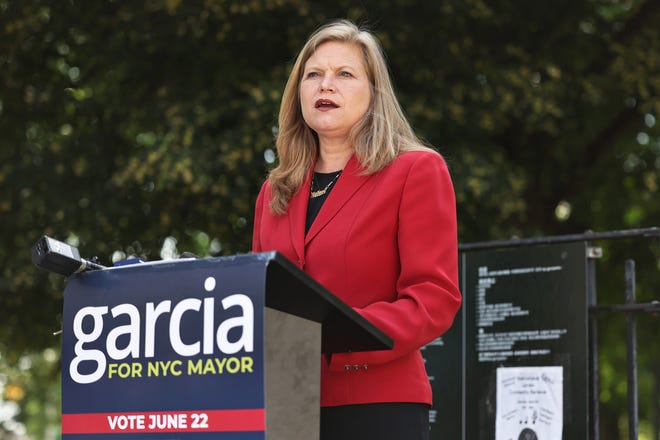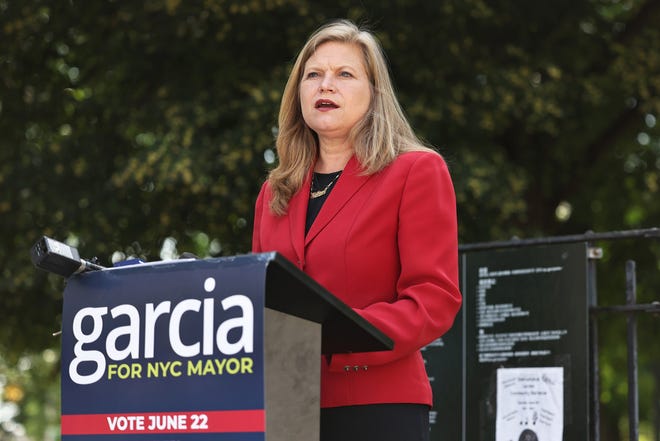
NEW YORK – New York City has had 109 mayors. Not one has been a woman. But that may change in the coming election for City Hall.
In a mayoral race centering on policing, public safety and New York’s recovery from the COVID-19 pandemic, the possibility of the first female mayor has only grown as the race narrows.
Three women running are major Democratic candidates in the June 22 primary, and most observers expect the winner not to face much of a Republican challenge in the general election in November.
Polling in the final weeks of the race has shown two female candidates – Kathryn Garcia and Maya Wiley – surging on the heels of big endorsements and after two men, Eric Adams and Andrew Yang, have been viewed as the front-runners throughout the campaigns.
To be sure, Adams, the Brooklyn Borough President and former NYPD officer who has made public safety his central message, remains the top candidate in most polls. But jostling for the second position recently has included close battles between Garcia, Wiley and Yang.
Whoever wins most voters’ picks as their top choice is not guaranteed a victory as the election will feature ranked choice voting for the first time this year, allowing voters to select their top five candidates.
“If New Yorkers elect their first woman mayor, it would signal that they believe she is the best person in the race to lead the city out of the crises we’re in,” said Ester Fuchs, director of the Urban and Social Policy Program at Columbia University.
New York City mayoral race:What to know about the candidates, issues and why a ‘progressive’ isn’t leading the way
Who are the women running to be New York City mayor?
Women in New York City have had to bear the brunt of the COVID-19 pandemic, raising children while juggling work, serving in front-line health care roles and facing the realities of job losses and economic inequities, said Pascale Bernard, vice president of public affairs and community organizing for the Planned Parenthood of Greater New York Votes PAC.
“So to have a woman leading the city that understands the needs of working moms, that understands the needs of caregivers, whether you’re caring for the generation prior to yours or the generation after you, those are really, really important things,” Bernard said.
Bernard’s organization has endorsed Garcia, who served in Mayor Bill de Blasio’s administration as head of the Sanitation Department. Garcia also won the endorsements of The New York Times and New York Daily News.

Her campaign has focused on more moderate polices than the two other women running as Democrats and relied on her crises management experience serving in city government. She’s called for an increase in police in certain areas to combat rising crime and also made climate change a pillar of her campaign.
Bernard touted Garcia’s support for an array of sexual reproductive health issues, including access to abortion, contraceptives and gender affirming care.
Wiley, meanwhile, recently picked up momentum after she won the backing of Rep. Alexandria Ocasio-Cortez, D-N.Y., which came as many other progressives have coalesced around her. EMILY’s List and the National Organization for Women-NYC have also endorsed Wiley.
Maya Wiley’s surge:New York City’s mayoral race is all about police, crime. Will Ocasio-Cortez endorsement give progressives a boost?
“Maya is a trailblazer who has dedicated her career to fighting for racial justice and equity. As a fearless advocate for families and communities of color, Maya is committed to confronting systemic inequalities and helping New York City’s most vulnerable recover from the health and economic ramifications of the COVID-19 pandemic,” Emily Cain, executive director of EMILY’s List, said in an April statement endorsing Wiley.
The lawyer, professor and former MSNBC commentator and member of de Blasio’s administration has called for a number of progressive policy proposals, including investing in public housing, financing a stipend for child and elder care and diverting police funding to schools and mental health and homelessness services.

Dianne Morales also has run as a progressive, embracing the “defund the police” movement and calling for more taxes on the city’s wealthy. Morales’ campaign, though, has faced a recent setback after her campaign staffers formed a union. Morales said some of their demands would violate campaign finance laws if she fulfilled them.
In the most recent major polls, Wiley and Garcia have placed in the top tier of candidates.
A poll conducted and released last week from PIX11, NewsNation and Emerson College found Wiley jumped to the No. 2 spot with 17% of voters, trailing Adams’ 23%. Garcia with 12% was just behind Yang, who had 15% in third.
A NY1/Ipsos poll conducted May 17-31 and released last Monday had Garcia in third with 15% support. Wiley was in only fifth, though the poll took place before the Ocasio-Cortez endorsement.
Data released from the city’s Campaign Finance Board shows the female candidates have also been among the leaders in the share of their donations coming from small donors.
Of the eight major Democrats, all three women had over 60% of their contributions coming from donors giving less than $175: Morales at nearly 90% and Wiley over 80%. Yang was the only other major Democrat to break 70%.
More:What will it take to get a Black woman elected governor?
The possible historic firsts in the NYC mayoral race
While women have come close before to winning the mayor’s office, the position has almost exclusively been held by white men. David Dinkins, a Democrat, was the city’s first and only Black mayor, elected in 1989.
Dinkins lost his 1993 re-election bid to Republican Rudy Giuliani, who faced Ruth Messinger, a Democrat, in the general election in 1997.
Messinger was the first and only woman to have won the Democratic Party’s nomination for New York City mayor. Before her unsuccessful bid, two women, Carol Bellamy running as the Liberal Party’s nominee and Diane McGrath running as the Republican nominee, lost in a landslide to Democrat Ed Koch in 1985.
In 2013, Christine Quinn, the first woman and openly gay city council speaker, was seen as the front-runner for the Democratic nomination, but her election hopes dwindled late in the primary amid de Blasio’s rise and criticism of her ties to Bloomberg, said Fuchs, who worked in Bloomberg’s administration.
In 2017, Republican Nicole Malliotakis, who is now a congresswoman for Staten Island and parts of southern Brooklyn, lost her challenge in the general election to de Blasio.
“The women are better positioned in this race,” Fuchs said.
Yang would be the city’s first Asian-American mayor. Adams, Wiley or McGuire would be the city’s second Black mayor. And Morales, who is Afro Latina, would, like Wiley, be the first woman of color as mayor.
“Knowing that these women candidates are viable, and if they won, it would be a symbolic victory,” said Michael Hendrix, director of state and local policy at the Manhattan Institute.

If a woman were to win, they’d join the ranks of the roughly 25% of women who are mayors of cities over 30,000 people, according to the Rutgers Center for American Women and Politics.
Tishaura Jones wants to reimagine policing in St. Louis:With rising crime and a push to ‘defund,’ can she do it?
Other prominent female mayors have risen in national profile in recent years, and if a woman were elected mayor of New York City, she could do the same, Hendrix said.
Washington Mayor Muriel Bowser, for example, was seen as a stark opponent of the Trump administration while holding strong support among residents in D.C., he said.
But the mayor of New York City holds a unique place in local American politics, overseeing a budget bigger than some states’ and acting as a spokesperson for the country’s most populous city, Hendrix said.
“By simply winning, (she would) become, of course, one of the most prominent mayors in the country and, by far, one of the most prominent female mayors in the country.”
Follow USA TODAY’s Ryan Miller on Twitter @RyanW_Miller
